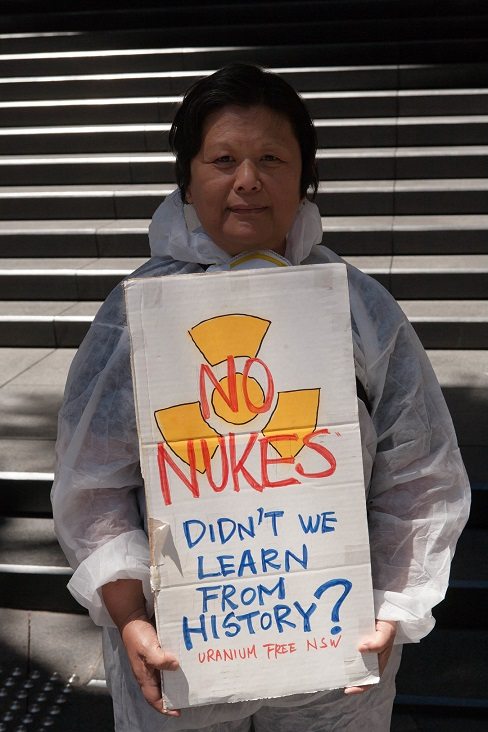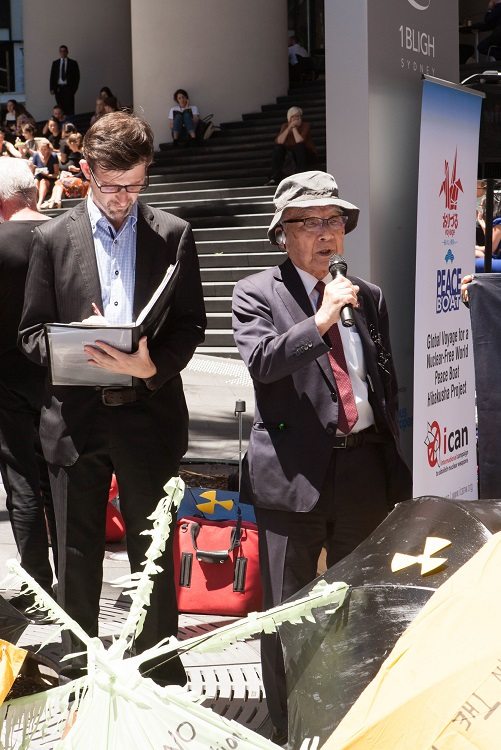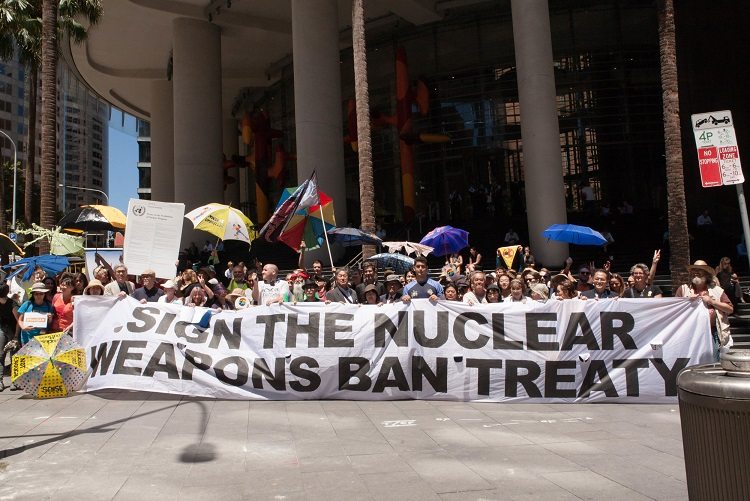John Lennon’s anti-war anthem was penned out of frustration with a pesky reporter. When the then Beatle was asked what he wanted to achieve by staging a “Bed-in” with his newly-married wife he said “Why don’t you just give peace a chance?”
He echoed the refrain several times throughout a heated interview before writing the song that would quickly become the soundtrack to a movement.
Lennon’s annoyance made sense back in 1969 and is just as relevant today.
Polling commissioned by Greenpeace Australia Pacific shows 73 percent of Australians support a ban on nuclear weapons and 77 percent believe that nuclear weapons make the world less safe.
Everyone knows and accepts there is no need for these weapons of mass destruction and we should be getting rid of them.
Those who bear them and those threatened with them are both equally aware of the indiscriminate carnage caused by nuclear weapons and the long-term environmental problems they pose.
This is as close as you get to consensus on a complicated global issue. But don’t let all the furious agreement put you off. Despite a shared understanding we have somehow come closer to nuclear war then we have been at any point in human history since 1953.

Members of the International Campaign to Abolish Nuclear Weapons (ICAN), Uranium Free NSW, the Maritime Union of Australia (MUA) and Greenpeace Australia Pacific gather with members of Japan’s Peace Boat outside the Japanese Consulate in Sydney to call on the nation to sign the UN Treaty on the Prohibition of Nuclear Weapons.
That was the year that the US and Soviet Union tested the first hydrogen bombs, and according to some of the world’s best scientists, including 15 Nobel laureates, the threat level today is the same as back then.
Yesterday, it was amidst this uncertain atmosphere that Japan’s Peace Boat sailed into Sydney Harbour.
In the early hours of Monday morning Greenpeace activists in boats darted around the 11-storey passenger ship as it passed through Sydney Heads.
The Greenpeace vessels were on the water to greet the Peace Boat and its passengers, who have survived some of the world’s worst nuclear tragedies.
As the ship homed in on the final stop of its Australian tour, passengers waved at the Greenpeace boats displaying banners welcoming them and urging the Australian and Japanese governments to sign the Nuclear Weapons Ban Treaty.
On too many occasions the world has witnessed the devastating humanitarian consequences of the use and testing of atomic bombs but the “nuclear option” remains mystifyingly on the table.
The Peace Boat, in conjunction with the Nobel Peace Prize-winning International Campaign to Abolish Nuclear Weapons (ICAN) and Greenpeace, is trying to change that. One of the most powerful ways is by giving a voice to the people indiscriminately impacted by nukes.
Japanese survivors of the bombings at Hiroshima and Nagasaki, the Fukushima nuclear disaster as well as a descendant of Indigenous Australian survivors of 1950s British nuclear weapons testing have shared their stories of the carnage caused by nuclear weapons as part of the Peace Boat’s ‘Making Waves’ tour.
Their stories are about survival and hope but like Lennon’s they are also driven by frustration, in this case at the Japanese and Australian governments’ shameful resistance to the new UN Treaty on the Prohibition of Nuclear Weapons.
That recalcitrance was highlighted yesterday at a Sydney CBD rally. Outside Commonwealth offices and just across the road from the Japanese Consulate, Nagasaki survivor Terumi Tanaka shared his story urged the governments to give peace a chance and sign the treaty banning nukes.

Nagasaki atomic bomb survivor Tanaka Terumi speaks at a protest outside the Japanese Consulate in Sydney to call on the nation to sign the UN Treaty on the Prohibition of Nuclear Weapons.
“It was a truly cruel and inhumane weapon that should never be used again. No one else on this planet should have to experience the pain that my fellow survivors experienced,” he told the crowd.
Tragically, Australia also has its own group of nuclear survivors, a legacy of the British testing conducted in Western and South Australia in the 1950s.
Karina Lester, father, the late Yankunytjatjara elder Yami Lester, was blinded by the Emu Field nuclear tests of 1953. She told the rally that about the “black mist” that rolled across the desert that day, leaving a path of sickness and destruction.
As terrifying as they are these individual survivor stories are, they would be among the hundreds of thousands that a nuclear attack could bring about almost instantly if they were ever deployed again, either by accident or design. But we already know this, and that is what makes the positions of Japan and Australia or any government that refuses to sign the treaty so mind-blowingly infuriating.
Australian and Japan cannot claim ignorance. Both nations have a fraught history with nuclear, that is why they must seize the moment and sign the UN Treaty on the Prohibition of Nuclear Weapons. It not only bans the use of nukes but also developing, testing, producing, manufacturing, transferring, possessing, stockpiling, using or threatening to use nuclear weapons, or allowing nuclear weapons to be stationed on a country’s territory. It also prohibits states from assisting, encouraging or inducing anyone to engage in any of these activities.
It is the kind of comprehensive ban the world needs more than ever, especially given that the Doomsday Clock has recently moved to two minutes to midnight.
We have been here before. Sixty-five years later and the world is back on the brink. Let’s not waste the opportunity again and maybe this time we can give peace a chance.

Members of the International Campaign to Abolish Nuclear Weapons (ICAN), Uranium Free NSW, the Maritime Union of Australia (MUA) and Greenpeace Australia Pacific gather with members of Japan’s Peace Boat outside the Japanese Consulate in Sydney to call on the nation to sign the UN Treaty on the Prohibition of Nuclear Weapons.
Put your name on the petition and tell Turnbull to sign Australia up!

